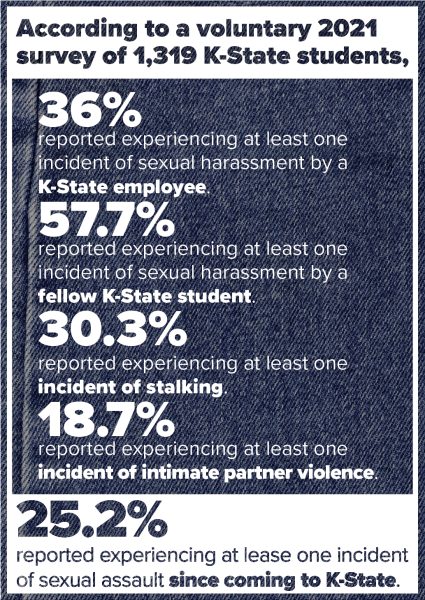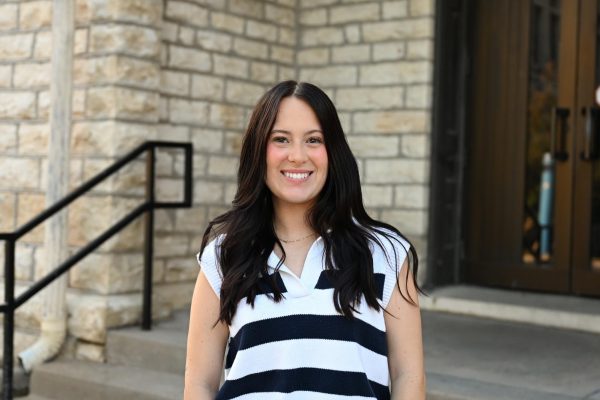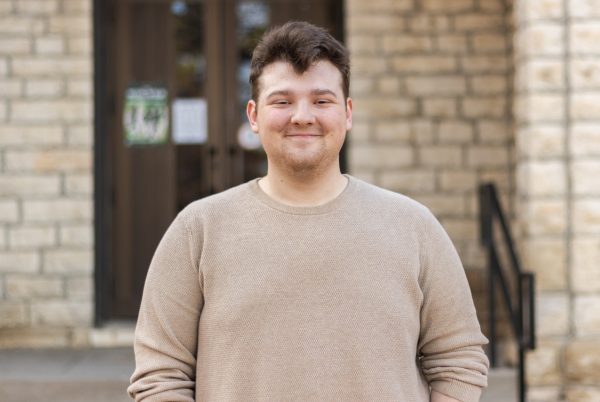In 1999, the Italian Supreme Court overturned a rape conviction because the 18-year-old survivor, who was raped by her married driving instructor, was wearing tight jeans. The justices ruled because her jeans were so tight, there was no way she could have gotten them off by herself, and therefore, she consented to the assault.
The next day, women working in the Italian Parliament broke protocol by wearing jeans to work in solidarity with the victim.

In response to the case, the non-profit organization Peace Over Violence created the Denim Day campaign to promote solidarity in fighting sexual violence.
Denim Day is the longest-running sexual violence prevention and education campaign in history. Every April, which is Sexual Assault Awareness Month, the movement invites people to wear denim in solidarity against sexual violence. This year, Demin Day was April 24.
“I think in terms of Denim Day, not a lot of people know the story,” Stephanie Foran, assistant director of Kansas State’s Center for Advocacy, Response and Education, said. “It’s important to … shine a light on the issue and let them know that you know, it doesn’t matter what you were wearing. It doesn’t matter, you know, how tight your jeans are. Sexual assault is sexual assault, and it shouldn’t matter what you’re wearing.”
According to its website, the CARE center offers free, confidential and voluntary resources to students and staff impacted by sexual violence, sexual harassment, domestic violence and stalking.
Foran said a big myth about sexual assault is it only impacts women.
“Sexual Assault Awareness Month is important because it shines a light on an issue that not necessarily a lot of people take seriously,” Foran said. “Most people look at sexual assault as a women’s issue, where it actually impacts everyone: men, women, trans folks — really, everyone.”
According to the Centers for Disease Control and Prevention, researchers found the number of Americans who experience sexual violence every year is unknown because so many cases go unreported.
In 2021, K-State initiated the Sexual Assault Climate Survey to better understand on-campus sexual misconduct, knowledge of campus resources and reporting processes and perceptions of K-State’s response and preventative efforts against sexual violence.
According to the 2021 Sexual Assault Climate Survey results, 57.7% of students who completed the survey reported experiencing at least one incident of sexual harassment by a fellow K-State student since attending K-State.
“One of the biggest misconceptions about sexual assault — at least on college campuses — is probably the idea that if you were drinking, that you somehow deserve to be sexually assaulted,” Foran said. “The worst thing that you should expect after a night of drinking is a hangover. You should never expect to be sexually assaulted. You should be able to go out and enjoy yourself and, like, have a good time with your friends without the fear of sexual violence kind of looming over you.”
The survey also found 62.5% of students who responded to this series of questions do not believe K-State is doing enough to prevent sexual assault.
CARE did tabling events around campus throughout the month of April showcasing Manhattan resources for survivors and information on sexual assault awareness.
“One of the most important things that we can do as advocates … is active listening and letting them know that they’re not alone in the situation,” Foran said. “Telling them, you know, it wasn’t your fault. It doesn’t matter what you were wearing, or if you were drinking, or if you went on a date with someone. No one deserves to be sexually assaulted.”
Foran said CARE has resources for students to get help both on and off campus.
“I know, it’s hard to tell someone that you don’t know about what happened to you,” Foran said. “However, we’re here to listen; we care for you. And we want to make sure that you can get through your healing process. And I mean, healing takes time. We’re not going to try and rush you or try to make decisions for you. Everything that we do for you is at your pace. So just know that you’re not alone.”
Those interested in contacting CARE for more information on scheduling an appointment, accessing resources or making a donation can call 785-532-6444, email [email protected] or visit its website.


























































































































